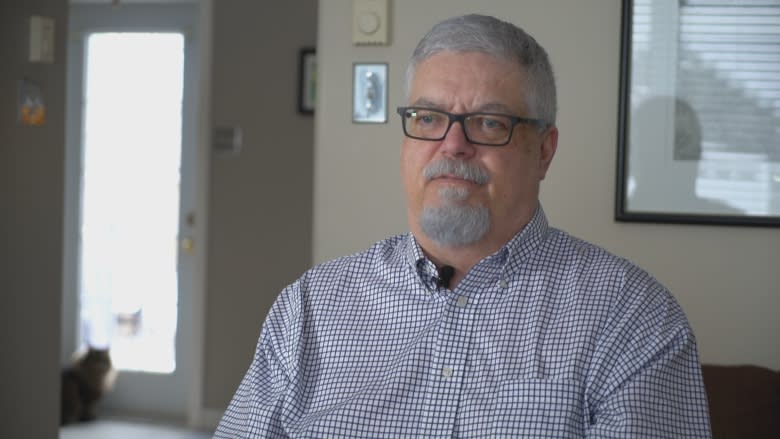Fibromyalgia/CFS patients fighting for awareness of career-ending illness
Peter Dawe says fibromyalgia and chronic fatigue syndrome — diseases that can cause debilitating exhaustion, joint and muscle pain — have quietly stalked him since his 20s.
It started as a grogginess he thought was caused by hard work or lack of sleep.
But during the 16 years he was the director of the Newfoundland and Labrador chapter of the Canadian Cancer Society it got progressively worse.
"This was deep. This is in your bones. I just couldn't function physically," said the 57-year-old.
He fought back and after leaving the Cancer Society more than a decade ago he became provincial candidate for the district of Topsail, but in 2010 he quietly bowed out, citing health reasons.
"I had a career and the disease had a career and the disease's career won out," he said.
Not taken seriously
Dawe says that along with his symptoms, he was fighting the stigma fibromyalgia and chronic fatigue syndrome carry and the grinding doubts of many people, even members of medical profession, who questioned if his illness was real or "all in his head."
"You end up being so frustrated, so down on yourself, that you don't talk to anybody. You stop going to professionals because there is no answer and the more you go, the worse you feel," he said.
"You get beaten down. Lots of times you end up quitting and you back out."
Affects different people differently
Chronic fatigue syndrome has recently also become known as myalgic encephalomyelitis or ME. It has many of the same symptoms as fibromyalgia.
Some patients have symptoms of both chronic fatigue syndrome and fybromyalgia and use the terms interchangeably but many believe fybromyalgia and chronic fatigue syndrome are distinct conditions. They say fybromyalgia patients are more likely to have chronic pain and chronic fatigue patients are more likely to have debilitating exhaustion.
Chronic fatigue syndrome affects people differently. Some cases are mild, but in severe cases it leaves patients unable to get out of bed for months or even years.
The cause remains unknown and these conditions are difficult to diagnose. Dawe said he had to fight for treatment because very few doctors in Atlantic Canada are knowledgeable about the conditions.
From triathlete to traumatized
One Canadian activist who's fighting for more research money and greater awareness of myalgic encephalomyelitis said his experience with medical system was traumatizing.
Torontonian Scott Simpson was a triathlete before he became sick. He's lived with HIV since the late 1990s, but his experience with the medical system didn't prepare him for becoming sick.
"It was traumatizing. In the context of HIV there is lots of support, there is a lot of support and there is lots of research funding. On the other end of our health care spectrum there is M.E.," says Simpson, a M.E. patient advocate with a group called Millions Missing Canada.
"I could count the number of M.E. doctor in Canada on one hand."
St. John's physician says tide is turning
Dr. Pradip Joshi, an internal medicine specialist in St. John's, says more members of the medical community are accepting that fibromyalgia is real.
"There are physicians who believe that this is a true entity and there are others who believe that this is a psychosomatic disorder. Lately, especially in the last five to 19 years, it is obvious that this is a clearly recognized condition," Joshi said.
Joshi believes more must be done to educate physicians and patients
"There are pharmacological as well as non-pharmacological treatments. Now that we have better criteria and better knowledge of this disease it is much easier to formulate a plan of treatment."
Prevalence unknown
The Newfoundland and Labrador Centre for Health Information said that in the past five years, 68 people with fibromyalgia have been hospitalized. It said provincial Medical Care Plan (MCP) coding doesn't capture if a patient visits a doctor for fibromyalgia.
Dawe and Simpson believe the true number of people dealing with fybromyalgia / chronic fatigue syndrome is much higher.
They describe it as an "epidemic" affecting half a million people across Canada and thousands in Newfoundland and Labrador.
"The numbers now are starting to become apparent and it's startling. Stats Canada from 2015, over a half a million Canadians self-identify with fibromyalgia and chronic fatigue syndrome," said Dawe.
"You are probably looking at thousands of people in Newfoundland and Labrador who have this condition but there are not getting treated by the medical system. They are not being recognized by the system."
Clarification : An earlier version of this story stated that fibromyalgia, chronic fatigue syndrome and myalgic encephalomyelitis are different names for the same disease. Although some patients have both, many believe fibromyalgia and chronic fatigue syndrome are different conditions. This article has been revised to reflect that.(Feb 23, 2018 6:22 AM)




